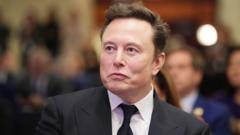The billionaire entrepreneur Elon Musk has made headlines by distributing $1 million cheques to voters in Wisconsin, just days before the state's crucial Supreme Court election. This bold initiative follows the refusal of the Wisconsin Supreme Court to halt the giveaway, despite protests from state Attorney General Josh Kaul. Kaul, a Democrat, has accused Musk of breaching a state law that prohibits gifts linked to votes.
The upcoming election, which could shift control of the state’s Supreme Court from liberals to conservatives, has drawn significant financial backing and scrutiny, marking it as the most costly judicial election in U.S. history. At a rally held on Sunday, Musk emphasized the importance of impartiality in the judiciary, stating, “We just want judges to be judges,” as he bestowed two cheques of $1 million each to voters who had petitioned against "activist" judges.
Kaul's legal challenge framed the giveaway as a potential attempt to purchase votes, a serious allegation Musk's legal team vehemently denied. They claimed that Kaul’s attempts to stop the distribution were infringing on Musk's First Amendment rights, asserting that the cheques served to foster grassroots opposition to activist judges rather than explicitly support a candidate.
Despite appeals from Kaul, the Supreme Court declined to review the case, allowing Musk to proceed with his initiative. The election has significant implications, as it could reshape the court's stance on crucial upcoming cases concerning abortion rights, redistricting, and voting regulations influencing the 2026 midterms.
Musk has openly backed conservative candidate Brad Schimel, a Waukesha County Judge, in this high-stakes race against liberal-endorsed Dane County Judge Susan Crawford. Schimel's campaign has seen substantial financial support from Musk, amounting to $14 million, amidst a staggering total expenditure of $81 million for the election.
Interestingly, Schimel distanced himself from Musk's rally in recent statements, suggesting uncertainty over Musk’s actions and intentions. This isn’t Musk’s first venture into voter enticement; previously, he offered $1 million daily to voters across Wisconsin and other pivotal states who signed a petition supporting constitutional rights, a contest later deemed legal by a Pennsylvania judge.
As the election draws near, the political landscape is charged with questions regarding the ethical boundaries of campaign financing and the influence of celebrity philanthropists in democracy.
The upcoming election, which could shift control of the state’s Supreme Court from liberals to conservatives, has drawn significant financial backing and scrutiny, marking it as the most costly judicial election in U.S. history. At a rally held on Sunday, Musk emphasized the importance of impartiality in the judiciary, stating, “We just want judges to be judges,” as he bestowed two cheques of $1 million each to voters who had petitioned against "activist" judges.
Kaul's legal challenge framed the giveaway as a potential attempt to purchase votes, a serious allegation Musk's legal team vehemently denied. They claimed that Kaul’s attempts to stop the distribution were infringing on Musk's First Amendment rights, asserting that the cheques served to foster grassroots opposition to activist judges rather than explicitly support a candidate.
Despite appeals from Kaul, the Supreme Court declined to review the case, allowing Musk to proceed with his initiative. The election has significant implications, as it could reshape the court's stance on crucial upcoming cases concerning abortion rights, redistricting, and voting regulations influencing the 2026 midterms.
Musk has openly backed conservative candidate Brad Schimel, a Waukesha County Judge, in this high-stakes race against liberal-endorsed Dane County Judge Susan Crawford. Schimel's campaign has seen substantial financial support from Musk, amounting to $14 million, amidst a staggering total expenditure of $81 million for the election.
Interestingly, Schimel distanced himself from Musk's rally in recent statements, suggesting uncertainty over Musk’s actions and intentions. This isn’t Musk’s first venture into voter enticement; previously, he offered $1 million daily to voters across Wisconsin and other pivotal states who signed a petition supporting constitutional rights, a contest later deemed legal by a Pennsylvania judge.
As the election draws near, the political landscape is charged with questions regarding the ethical boundaries of campaign financing and the influence of celebrity philanthropists in democracy.





















